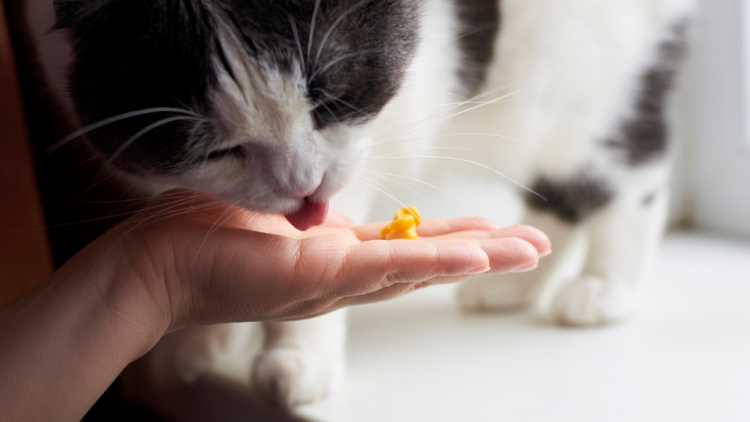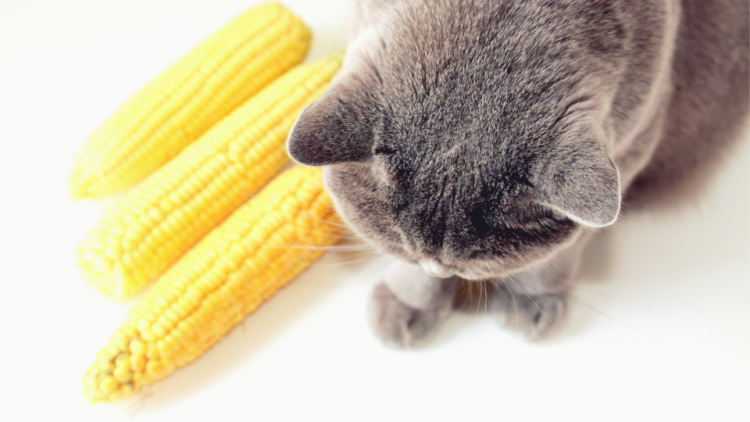Corn is a readily available food source for humans that can be combined with almost anything, but can cats eat corn as well? Considering the fact many cat food manufacturers use corn as a filler, the answer is yes, cats can eat corn. But, while corn might not be harmful, it doesn’t mean it’s a healthy choice for your feline family member.
With summer just around the corner, we’re discussing whether our feline friends can also indulge in this versatile veggie.
Table of Contents:
- Can cats eat corn?
- When is corn bad for cats?
- Corn in cat food
- Can kittens eat corn?
- What kind of corn snacks are best for cats?
- Can cats eat corn husks?
- How to feed corn to cats
- Key Takeaways
Pro Tip: Cats simply love to indulge in some strange and interesting tastes. You can never eliminate the risk of your pet eating something they shouldn’t but pay attention to any symptoms they might demonstrate, make sure to get pet insurance before a problem occurs and seek veterinary attention if you’re concerned.
Can cats eat corn?
Yes, cats can eat corn safely. In fact, your cat is probably already eating corn on a daily basis. Due to its wide availability and fiber content, corn is commonly used as a filler ingredient in many commercial cat foods.
However, the more important question here is whether cats should eat corn. Does corn offer any nutritional benefit to felines?
Well, as mentioned earlier, corn is rich in dietary fiber, which ensures efficient food digestion and helps regulate your pet’s bowel movements. In addition, fiber creates a sense of fullness, so adding a little corn to your kitty’s regular diet will make them feel fuller for longer and eat less.
Whole corn is also considered to be quite low in fats and can therefore be given as an alternative for high-fat foods. This doesn’t apply to refined corn oil which is relatively high in fat.
Finally, corn comes with a fair amount of protein. The problem is, even though this cereal grain contains numerous varieties of protein, it lacks essential amino acids. Being obligate carnivores, cats thrive on animal protein which is high in amino acids.
In summary, while corn definitely isn’t toxic to cats, it does not offer substantial nutritional value and mostly acts as a filler agent in their stomachs.
When is corn bad for cats?
So, corn is safe for cats if given in small amounts as an occasional snack. Too much corn can be harmful and here’s why:
-
Carbohydrates and sugar. Cats don’t digest carbs well and they don’t need them as much as they need animal protein. The most harmful component of the carbohydrates present in corn is sugar, which is mostly found in the form of sucrose. Blood sugar level spikes can lead to a number of health issues, including cardiovascular and heart diseases.
-
Allergic reactions. It’s not uncommon for cats to be allergic to corn. In fact, corn is known to trigger most cases of allergic reactions in felines. Some of the signs of corn allergy include excessive scratching, diarrhea, vomiting, sneezing, coughing, etc. Your feline friend might also develop gluten intolerance due to the presence of zein in corn. Signs of gluten intolerance include diarrhea, bloating, weight loss, and fatigue.
-
Poor digestion. Corn contains phytic acid, a substance known for its ability to inhibit the absorption of minerals like iron and zinc. Sprouting, fermenting, or soaking corn could decrease the effects of phytic acid but it can also result in loss of other important minerals.

Corn in cat food
Many cat food manufacturers use corn because it is less expensive than animal muscle meat. The corn in cat food serves as a blank filler and offers little nutritional value.
Remember, cats are obligate carnivores and need to get their protein from animal sources. So, while corn is not necessarily harmful to our feline companions, they need to eat a meat-based diet. Moreover, some cats shouldn’t consume cat food that contains corn and other grains such as wheat and soy depending on their overall health and possible allergies.
Can kittens eat corn?
In general, kittens shouldn’t eat corn, mostly due to their sensitive stomachs. In addition, small kittens need certain nutrients in order to grow and develop properly and, as we said earlier, corn acts as a filler without any significant nutritional benefits.
What kind of corn snacks are best for cats?
Corn comes in various forms: popcorn, polenta, sweet corn… Naturally, you might be wondering which variants are safe for feline consumption. Following is a quick breakdown of the most common corn varieties and the reasons why cats can or can’t eat them.
-
Popcorn. As you might have noticed, kitties are quite fond of popcorn. But although popcorn is a tasty treat for humans, it doesn’t really offer any nutritional benefits for your cat. Not to mention, it often contains seasonings and butter which can cause issues like diarrhea and vomiting.
-
Canned and frozen corn. Canned corn is a good option for cats as they get to drink lots of water while snacking on the canned corn. Frozen corn can also be given as long as you don’t offer it while it is still cold.
-
Corn chips usually have a lot of added salt and some varieties contain spices, cheese, and preservatives that can be toxic to cats.
-
Tortillas and bread. Any type of bread, including tortillas, tacos, and quesadillas, should be on the ‘forbidden’ list when it comes to cats. This is because bread is usually devoid of any nutritional value for our feline friends and they quickly fill their small tummies. If your pet eats a little bit of bread, it probably won’t do any harm, but avoid offering corn-based types of bread as a snack.
-
Corndogs. Although corndogs have meat in them, they are made of fried corn batter, which is not a very healthy choice for your cat. What’s more, the processed sausage in the corndog is one of the worst types of meat you can feed to your feline companion.
-
Polenta. Not only does polenta feature a number of potentially poisonous seasonings, but it also doesn’t meet your cat’s dietary requirements. Similar to cornmeal, it will expand to take up lots of room once eaten but will offer no nutritional value.
-
Cooked corn. Boiled and grilled corn are the safest options for cats. Not only are they low in fat, but they keep most of the nutrients of natural corn. Again, make sure the corn is unseasoned before feeding it to your kitty and offer it in small amounts.
-
Sweet corn. If served grilled or boiled, removed from the cob, and without any seasoning, sweet corn shouldn’t cause any harm.
-
Fried kernels. Pre-packaged fried corn kernel snacks are definitely not for cats as they contain high amounts of sodium and fats.
-
Candy corn, creamed corn, and caramel corn are all unhealthy treats for cats due to the fact that they’re high in sugar and contain additives that can be toxic for cats.

Can cats eat corn husks?
While corn husks aren’t toxic to cats, they can cause issues like vomiting, diarrhea, excessive drooling, and loss of appetite, or result in intestinal blockage. Corn flakes, baby corn, and corn starch can also cause gastrointestinal issues in cats.
How to feed corn to cats
When it comes to giving corn to your cat, the most important thing to remember is to offer it in moderate amounts and as an occasional snack. The corn should also be served plain and without any additional ingredients such as butter, salt, milk, and seasonings.
Be sure to consult your vet before offering any new human foods to your cat. They should be able to provide better answers about what your individual pet can and can’t eat based on its medical history.
If your vet gives you a go-ahead, start by feeding just a small amount of corn to see how your kitty reacts to it. If you notice gastrointestinal symptoms or signs of an allergic reaction, stop giving your cat corn and call your vet.
Pro Tip: Cats can develop a food allergy at any point in their lives, so getting an adequate pet insurance plan before allergy symptoms are present means that such chronic conditions will be covered for the duration of your pet’s life.
Key Takeaways
- Feeding your cat small amounts of corn from time to time probably won’t have any harmful effects.
- However, corn isn’t providing added nutritional benefits for your pet, and for that reason, it shouldn’t be added to their diet regularly.
- Many kitties are allergic to corn so be sure to introduce corn into your cat’s diet slowly to see if they develop any symptoms of a food allergy.
- Never feed your cat corn snacks that contain salt, seasonings, butter, or other additives.
- If you have any questions or concerns regarding your cat’s diet, be sure to consult your vet.
